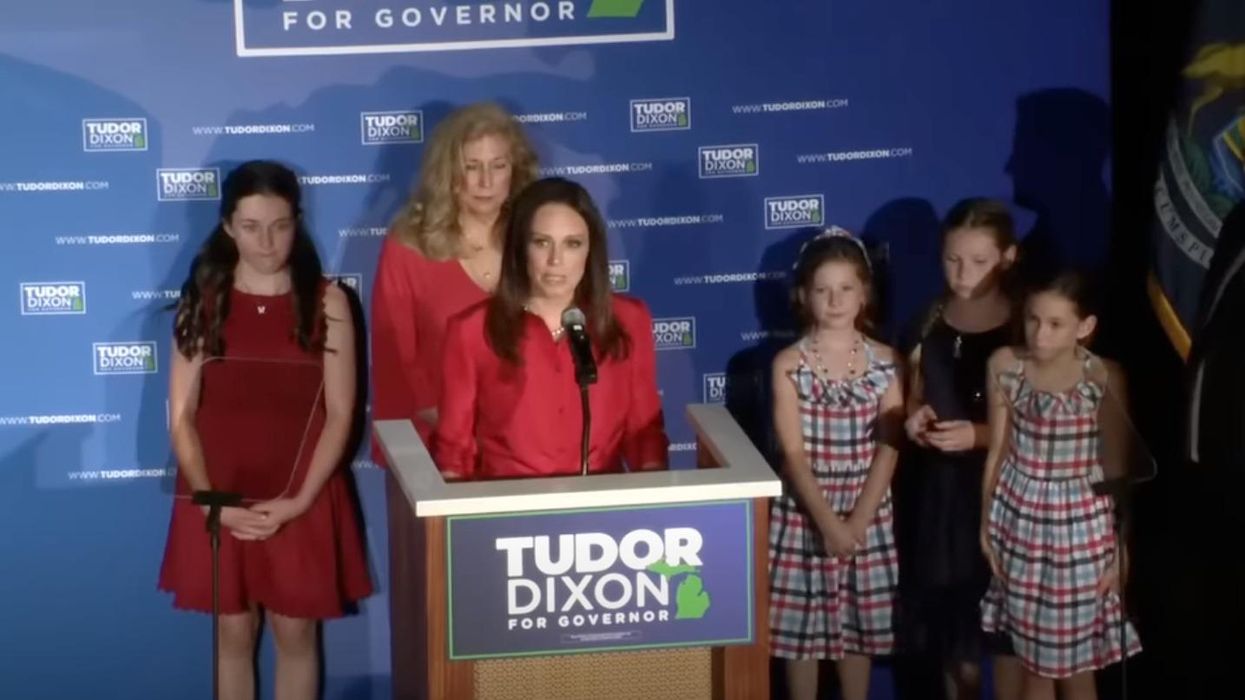The trial of the four Michigan militiamen facing federal charges for allegedly plotting to kidnap Gov. Gretchen Whitmer got under way with jury selection this week. It’s happening in an environment in which prosecutors appear to have established firm control over both evidence and witnesses, with the judge overseeing the case consistently ruling in their favor.
The defendants—Adam Fox, 37, of Grand Rapids; Barry Croft, 44, of Bear, Delaware; Daniel Harris, 23, of Lake Orion; and Brandon Caserta, 32, of Canton, Michigan, all members of the so-called “Wolverine Watchmen” militia—are leaning heavily on claims that the government entrapped them into the plot to abduct Whitmer from her summer home and put her on “trial,” for which they now face federal kidnapping-conspiracy charges. Its outcome could have broad ramifications for how federal authorities tackle the rising tide of right-wing domestic terrorism, as well as ongoing prosecution of the Jan. 6 U.S. Capitol insurrectionists.
The Justice Department originally charged six men in the case, but two of them entered guilty pleas as part of their agreement to serve as prosecution witnesses at the trial. Seven other men face state charges from Michigan authorities for their participation in the plot.
The defense’s entrapment claims suffered a major blow last month when one of the original six co-defendants in the federal case, Kaleb Franks, entered a guilty plea to the charges as part of an agreement to cooperate with prosecutors as a state’s witness. As part of the bargain, Franks confirmed that neither he nor his co-defendants were set up by the government.
"The defendant agrees to plead guilty to the superseding indictment, which charges him with kidnapping conspiracy," the agreement read, noting that Franks, 27, of Waterford Township, "understands the crime," and that "[the] defendant knowingly and voluntarily joined that agreement." Moreover, the agreement states, so did his alleged cohorts.
Nonetheless, the defendants have a lot of material to work with in constructing an entrapment defense. The FBI deployed 12 undercover informants in its investigations, and at least one of them—a man nicknamed “Big Dan”—played a key role in providing the group with paramilitary training as well as acting as a second-tier leader for the “Watchmen.” Three of the FBI agents involved in the case are no longer part of the prosecution’s witness lineup in large part because they have run afoul of the agency for behavior mostly unrelated to the militia case.
Judge Robert Jonker, as BuzzFeed’s Ken Bensinger reports, has so far ruled in the prosecution’s favor regarding these claims, not only refusing to toss out the charges on entrapment grounds but ruling last week that the defense could not raise the entrapment claims for the trial’s first half. Jonker also has agreed to the prosecutors’ efforts to limit the defendants’ evidence and witnesses, and to exclude hundreds of statements derived from the government’s own secret recordings, which defense attorneys insist establish that no conspiracy existed, from the proceedings.
No doubt prosecutors are intent on not having a repeat of the 2013 case of another Michigan far-right paramilitary group, the Hutaree Militia, against whom all charges were dismissed by a federal judge who found that while the assembled extremists discussed all manner of antigovernment violence, they did not take the concrete steps to accomplish it required in all domestic terrorism cases.
That is not really an issue in the case against the Wolverine Watchmen, however. Not only did the men engage in paramilitary training and surveillance of Whitmer’s home as part of their plot, but they also purchased weapons and bomb-making material in their preparations.
Prosecutors list 19 such concrete acts by the defendants, beginning with Fox’s August 23, 2020 proposal to kidnap Whitmer during a meeting with Harris and Caserta. The men also held field training exercises in September 2020, the indictment says, in which they practiced tactics for combatting Whitmer's security detail. Croft and Harris tested explosives and hung human silhouette targets nearby to gauge the spread and reach of the shrapnel.
If convicted on the kidnapping charge, all four could face the prospect of spending the rest of their lives behind bars. Three of the men—Fox, Croft, and Harris—also face charges of conspiracy to use a weapon of mass destruction related to their efforts to construct a bomb that would take out a bridge near Whitmer’s home, which like the kidnapping charge carries a maximum life sentence.
The men originally connected as a militia unit during the April 2020 protests in Lansing over COVID-19 restrictions placed by Whitmer, and were part of the contingent of armed militiamen who entered the Capitol building during one of the protests. It later emerged that their original plan involved a complete takeover of the building, taking Whitmer and others hostage, and holding televised “trials” followed by executions. However, the men later scaled back their plans to simply kidnapping Whitmer at her home.
Defense attorneys are claiming the federal informants ensnared the militiamen in a plot devised by the FBI that they otherwise wouldn’t have participated in, largely because several of the informants organized and oversaw some of the men’s meetings. However, the circumstances of the case are similar to other previous militia trials—such as the 1996-97 Washington State Militia trial, in which an undercover FBI agent named Michael German had provided the plotters with a meeting place (which happened to be packed with cameras and recording devices) and had overseen some of the gatherings—that have ended with juries handed down guilty verdicts.
“It is a really hard defense. You are saying my client did it, but you should not punish him anyway because it wasn’t fair, somebody manipulated him into it,” Jesse J. Norris, a criminal justice professor at the State University of New York, told The New York Times.
German told the Times that he found the contingent issues about informants and agents around the Wolverines case troubling, mainly for what it suggested in terms of likely sloppiness in the course of the investigation and prosecution. “There is certainly a lot of lumber that this case seems to have given defense attorneys to build a story about what happened,” he said.
As Bensinger has noted in his reportage on the informants, the FBI has long made use of confidential informants in its criminal investigation, and has employed them to infiltrate everything from mafia gangs to leftist dissident groups. Among the program’s previous targets have been Al Capone and the Ku Klux Klan, as well as the Black Panthers and Martin Luther King Jr.:
The tactic has a decidedly mixed record. Informants have helped make cases that averted terrible violence. But informants have also coerced innocent people, falsified evidence, and even committed murder while working for the FBI. The bureau’s reliance on informants, much criticized in the 1970s, received renewed scrutiny in the wake of 9/11, when they were used to probe Muslim groups for alleged involvement in Islamic terrorism.
The rise of far-right political violence, however, poses special challenges for law enforcement. "This is a different type of domestic terrorism phenomenon than we’ve faced in previous decades — completely different from anything I’ve observed," Javed Ali, a University of Michigan professor, told the Associated Press.
"You’ve got all these points on a very diverse threat spectrum — not centralized in any one corner, no single groups, no national leadership, completely disorganized and disaggregated," Ali said. "It’s difficult for law enforcement to spot these threats. The Whitmer plot is a case in point."
Attorney General Merrick Garland stressed in a recent speech that the government is focused “on violence, not ideology” in its approach to domestic terrorism, noting that “in America, espousing a hateful ideology is not unlawful.” But if the Wolverine Watchmen’s legal defense is able to succeed by establishing in court that the methods used to build the Michigan case are unsound, it could have far-reaching consequences for the government’s ability to investigate these groups—as well as to prosecute other related cases, such as the January 6 Capitol insurrection prosecutions. It also could feed the conspiracist claims by Tucker Carlson and others that the FBI manipulated those rioters into performing criminal acts.
Most militia groups have kept a lower profile since the Michigan kidnapping bust in October 2020 and the post-January 6 arrests, according to Rachel Goldwasser, a research analyst with the Southern Poverty Law Center.
The outcome of the Michigan trial, she said, may "indicate whether they stay in their foxholes or come out as a force in public again."
Reprinted with permission from Daily Kos












Trump Cabinet Nominee Withdraws Over (Sane) January 6 Comments